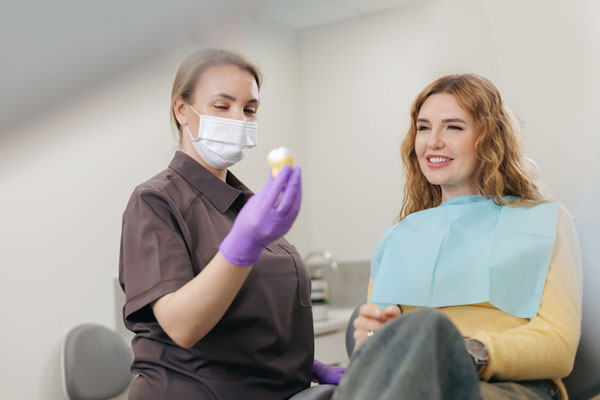General Dentistry: Fluoride Pros and Cons

For the past few years, most communities have been adding fluoride to their water sources at the suggestion of those in general dentistry. Everyone accepted the idea because fluoride is known to prevent tooth decay. Dentists perform fluoridation on the teeth during routine dental checkups. What exactly is fluoride and what are its benefits and potential disadvantages?
Fluoride occurs naturally and is common in the earth’s crust. In certain parts of the world, it is present in large amounts that are considered dangerously excessive. The level of fluoride in fluoridated water is deemed to be safe and beneficial for the dental health of the community.
What to know about fluoride
The pros of fluoride
Mixing a tiny part of fluoride with water that contains no significant amount of fluoride is one of the easiest ways to improve the oral health of the people in the community. Fluoride helps to fortify the teeth enamel, which makes it possible to fight off dental issues like cavities, tooth decay and any disease that may cause tooth loss. It can also improve bone density.
Currently, two out of every three water sources in America are fluoridated, and this has consequently decreased the occurrence of cavities. This is particularly true for underprivileged populations who have no access to regular oral care. This measure is cost-effective and more affordable than the cost of general dentistry procedures such as cavity fillings.
The cons of fluoride
In recent times, questions have been raised regarding the safety of fluoridation, including ethical concerns. Some people opine that people should be able to decide to have their water fluoridated or not without the government forcing fluoride on the population. Others think that fluoridating water is now outdated because almost all toothpaste nowadays has a sufficient percentage of fluoride in its composition.
Certain studies have shown that fluoride may contribute to weakening the bones and maybe even the joint’s connective tissues. Fluoride also causes a condition known as fluorosis, which causes tooth discoloration. Fluorosis stains the teeth with an unappealing brown shade, but it has no harmful physical effects on the teeth.
A recent study conducted by the National Institute of Mental Health postulated that teeth damaged from fluoride could be associated with behavioral and psychological problems. Fluoride may also contribute to protein intolerance and protein digestion problems. Scientists have connected stomach and abdominal pains such as indigestions and cramps to fluoride.
Many believe that people who regularly deal with the recurrent, unexplainable stomach maladies may be sensitive to fluoride, but only a few link their discomfort to their drinking water. Supporters of fluoridation argue that the levels of fluoride required for these adverse effects are much higher than the current level of fluoride present in fluoridated water.
In conclusion
The advantages of fluoridation far outweigh the potential adverse impacts. Fluoride helps millions of less-privileged children maintain good dental health when they do not have access to general dentistry and has reduced the occurrence of preventable tooth decay. Not all places in the United States have fluoridated water, and if your water contains fluoride, it is not so hard to avoid if you are worried about its health implications.
Request an appointment here: https://thechesterfielddentist.com or call Chesterfield Dentist at (804) 412-0867 for an appointment in our Chester office.
Check out what others are saying about our services on Yelp: Read our Yelp reviews.
Recent Posts
A healthy smile depends on more than daily brushing and flossing. If you are experiencing gum disease or severe plaque buildup, a deep teeth cleaning can restore your oral health. Unlike a standard dental cleaning, this treatment targets bacteria below the gumline and reduces the risk of serious oral health issues.Deep teeth cleaning, also known…
Multiple damaged or missing teeth can impair function and degrade the appearance of your smile. However, dental restorations can restore both the look and function of your teeth.There are many different types of dental restorations, and most of them can be used to address issues with multiple teeth. The type of restoration used for your…
Modern dentistry provides many options for treating decayed or missing teeth. Although dental restorations can improve oral function and appearance, patients often struggle to choose an appropriate treatment method. Fortunately, dentists have the knowledge and experience to help patients make a decision.Dentists can restore single or multiple teeth using various materials and techniques, including:Metal or…
A visit to a cosmetic dentist is the first step in improving your smile. These dental professionals offer a range of services designed to enhance the appearance of teeth, gums, and bite alignment. Whether you want to remove stains, reshape teeth, or create a more symmetrical smile, the process starts with a thorough consultation and…


